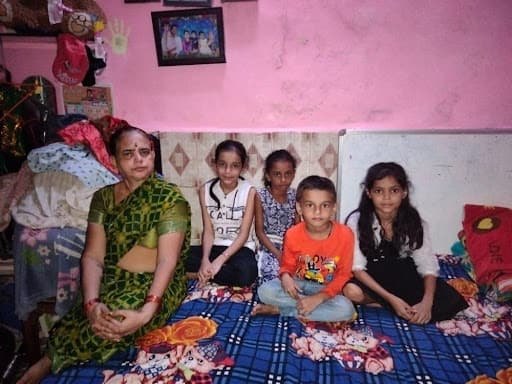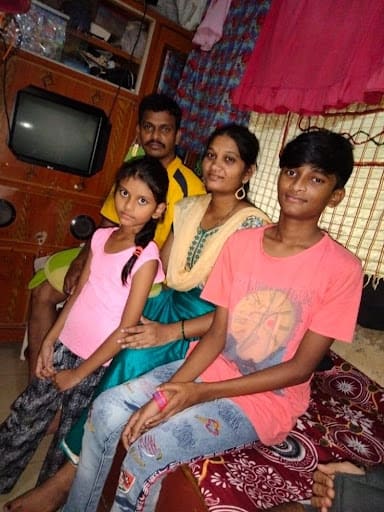Saili and Mayank [names changed] live in a Mumbai slum, with their parents in a meagre dwelling, hardly 10ft x 10ft, divided into a bedroom and kitchen. They study in class 3 and class 7 respectively, in nearby schools. Scratch that. They are enrolled in schools would be more accurate, as any meaningful study or education has come to a stand-still since the school closure which began in March 2020.
Their parents manage to earn about Rs 30,000 a month for the family, and luckily do not have the burden of school fee expenses, as they have been enrolled under the Right to Education quota. Both parents have to go to work, although the mother manages to work from home at times. The children’s grandmother can look after them during the day, but there is no separate smartphone for the children to attend online classes: they get to attend whenever either parent is at home.
On being asked if she is able to follow what is taught during online classes, Saili hesitates, almost embarrassed, and then says “no”. When asked questions from his textbook, it is clear that Mayank too has difficulty in following online classes. Parents are unable to help due to lack of time, and it is almost impossible to ask questions or get feedback in online sessions.
Their parents, too, are very concerned about the widening gap in understanding, as bridging this gap to catch up will appears to be a mammoth challenge given the continuing school closure. They are understandably anxious about their children’s future.
Read more: Virtual classes for younger kids: An uphill journey for both teachers and parents
School closure woes common
A few houses away, Parul [name changed] lives with her sister and extended family; the joint family has seven children and five adults, including Parul’s grandmother. They all live in a two-room house. The family has only two smart-phones, and there are times when only one of them is available for children to use for their online classes: one or at most two devices to be shared across seven children in two rooms.
Only two of the seven children have school admission under RTE, the rest have to pay the full fees. The fees itself amounts to about Rs 5000 per month for all the children, which is a heavy burden on the family’s monthly income of about Rs 30,000. Aside from this, the data plan for the phones costs about Rs 600 per month. The children have managed with hand-me-down books so far.

Despite these Herculean efforts to just stay the course, online school is not very useful. Children have to time-share the available devices, and even while in session, the problem of lack of interaction means that understanding remains poor. Parul’s sister in class 4 is able to read her English book, and her cousin in class 3 is able to read with some difficulty. But neither understand what they read, even simple English sentences. The children go for private tuition at an additional expense of about Rs 350 per month per child, since there is no one to help at home, but that appears inadequate. The comprehension gap is widening with every additional day of school closure.
That online schooling is a farce, especially for children in these families, is painfully obvious. Adding to the irony of the situation is the fact that the above locality has hardly had 1-2 COVID cases among hundreds of families in the whole of 2021. Official statistics show that urban slums were hardly hit in the 2nd wave, likely because most of them were exposed in the first wave and developed robust immunity.
Read more: When the screen is your child’s classroom and playground
Busting myths around causes of school closure
Today, what stands between our children and their education and future is not the pandemic, but a mountain of myths:
| Myth | Fact |
| Online is education | Online learning can at best be a supplement; children, especially younger ones do not learn online |
| Children are susceptible to COVID | Severe COVID in children is rare; less risk than other diseases, even traffic accidents |
| COVID-19 vaccines for children are immediately necessary | Children already at low risk (see above); Long term safety of current vaccines is unknown |
| Schools are COVID super-spreaders | Schools contribute much less to COVID spread than other activities; 170 other countries have opened schools safely |
| Third wave is impending, it will affect a lot of children | No scientific basis for these claims; much of India, including children, have already been exposed |
Myth-1: Online is education — Online is not education, as evidenced by the above anecdotes. Even pre-pandemic, online learning was at best a supplement, and that too for older children and college students. Younger children absolutely cannot learn online, and in fact they even forget skills.
A study by Azim Premji University among children of classes 2-6 across 5 states of India, undertaken in January 2021, found that as much as 82% lost at least one mathematical skill and 92% lost at least one language skill, compared to the previous year. Even in affluent Netherlands with only a short lockdown and high speed broadband access, a research study concluded “students made little or no progress while learning from home”.
Doctors in Bengaluru have reported that among children under the age of 5, there has been over a 10-fold increase in those with speech disorders, due to lack of social stimulation and increased screen time. Thus a loss of 1.5 years for a child can cause long-term harm.
Myth-2: Children are susceptible to COVID — While the first myth underestimates the costs of school closure, the second myth is overestimation of COVID risk for children. Statistics clearly show that the risk of severe COVID in children is smaller than other (already small) risks they face in life: such as other diseases, and even traffic accidents.
For children and young adults, the mental health issues arising from lockdown and loss of social contact is much more concerning than COVID. Scotland reports rising numbers of children reporting to hospital for self-harm. In the 14-19 age-group, US statistics reveal a 14% increase in non-COVID deaths in 2020, i.e. caused by lockdown-related mental health issues, while COVID deaths in this age-group is much rarer.
Myth-3: COVID-19 vaccines for children are necessary — The second myth leads to the third: that COVID-19 vaccines for children are necessary before we can open schools. Not only is there no medical need for such vaccines, since children are already at low risk, but also, we will not know the rare and long-term effects of current vaccines on children for a few years. Universal vaccination of children without long-term testing would thus be tantamount to medical negligence.
Myth-4: Schools are super-spreaders — It is a myth that schools are super-spreaders. Study after study done in various countries has concluded that schools do not contribute significantly to COVID spread. The inconsistency in India is even starker: even as we have had everything else open, including malls and theatres, schools remain suspended. In UNESCO’s website tracking school closures across the world, India has the dubious distinction of closing its schools for the maximum period of time.
While the US CDC recommends opening of schools with masking and 3-foot distancing (revised from earlier 6-foot), Sweden has always kept its primary schools open, with no distancing or masking requirements for children. And a comparison between schools in Sweden and neighbouring Finland showed that school teachers were not at additional risk of COVID-19 due to in-person classes.
Myth-5: The impending third wave will affect a lot of children — There have been a lot of claims, without any scientific basis, of an impending third wave which will affect children. Seroprevalence studies have shown that a vast majority of Indians have already been exposed to COVID-19. Despite schools being closed, children have also been exposed: we just did not know about it since severe COVID is very rare in children and young adults.
School closure based on this mountain of myths is gross injustice being done to an entire generation of children. We as a nation must be extremely concerned about this. Those making decisions must be concerned that at least some of these children will grow up to write the history about the mindless injustice that was done to their generation. Will these decision makers redeem themselves at least now?
